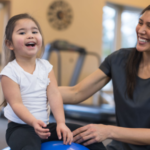
Helping children reach their full potential
Pediatric Physiotherapy
Pediatric physiotherapy is a branch of physiotherapy that focuses on the assessment and treatment of infants, children, and adolescents with a wide range of conditions affecting their physical development, function, and movement. Our goal of pediatric physiotherapy is to promote optimal physical function, prevent further disability, and improve overall quality of life for children and their families.
Our physiotherapists use a variety of techniques and interventions tailored to the individual needs of each child, which may include exercises, manual therapy, play-based activities, and assistive devices. Our Collaborative approach helps us develop comprehensive treatment plans that address the unique needs of each child.
Book Appointment
Benefits of Pediatric Physiotherapy
Unleash your Childs full potential for recovery & improved mobility with our specialized physiotherapy services tailored to their unique needs.
Pediatric physiotherapy is recommended as it can help children overcome physical challenges, improve their mobility and function, reduce pain and discomfort, and enhance their overall quality of life. Pediatric physiotherapy is beneficial for a variety of reasons. Here are some of the key reasons why pediatric physiotherapy is good:
Benefits
- Improved gross motor skills
- Enhanced balance and coordination
- Increased independence in daily activities
- Improved overall physical function, mobility, and quality of life
- Improved participation in sports and physical activities.
- Increased strength and endurance
- Pain relief
- Improved respiratory function
- Enhanced motor planning and sensory integration
- Reduced risk of falls and accidents
By improving physical function and mobility, pediatric physiotherapy can also enhance a child’s overall quality of life, allowing them to participate more fully in daily activities and social interactions, and promoting independence, self-esteem, and confidence. Pediatric physiotherapy can also support a child’s overall health and well-being, including their mental health and emotional well-being, by promoting physical function and mobility.
How Outcome Is Measured
Elevate your Childs health to new heights with our advanced physiotherapy therapies, helping them regain strength, flexibility, and vitality.
ASSESSMENT TOOLS USED
We use several standardized assessments and tools used in measuring the outcome of pediatric physiotherapy. These assessments evaluate a child’s physical abilities, including gross motor skills, fine motor skills, balance, coordination, strength, and endurance.
Gross Motor Function Measure (GMFM)
GMFM evaluates gross motor function in children with cerebral palsy or other neurological conditions.
Peabody Developmental Motor Scales (PDMS).
PDMS measures both fine and gross motor skills in infants and young children
Pediatric Balance Scale (PBS)
GMFM evaluates gross motor function in children with cerebral palsy or other neurological conditions.
Bruininks-Oseretsky Test of Motor Proficiency (BOT-2)
It helps measure fine and gross motor skills in children aged 4-21 years.
The Timed Up and Go (TUG) test
The Timed Up and Go (TUG) test evaluates mobility and balance in children and adolescents.
Pediatric Evaluation of Disability Inventory (PEDI)
PEDI assesses functional performance and measures changes in a child's ability to perform everyday activities.
Conditions Treated by Pediatric Physiotherapy
Discover our specialized physiotherapy services designed to provide your child with exceptional care and optimize their overall well-being.
Pediatric physiotherapy can be helpful for children and adolescents who have a range of physical impairments and disabilities. Some of the conditions that are commonly treated by pediatric physiotherapists include:
Conditions Treated
- Delayed developmental milestones
- Cerebral Palsy
- Down syndrome
- Spina Bifida
- Autism Spectrum Disorder
- Traumatic Brain Injury
- Brachial plexus injuries (nerve damage in the shoulder)
- Muscular Dystrophy
- Juvenile Rheumatoid Arthritis
- Sports Injury
- Post Fracture Treatment
- Genetic Conditions (Down Syndrome)
- Congenital heart disease
- Amputations or limb differences
Pediatric physiotherapy can also be helpful for children who have experienced trauma or injury, or who are recovering from surgery. The specific treatment plan for a child will depend on their individual needs and condition, and may involve a combination of exercises, stretching, manual therapy, and the use of assistive devices.
Why Us?
Where Care Meets Community. Discover a unique intersection of care and community at a community-based physiotherapy center.
RCP Health emphasizes treating the mind and body, prioritizing physical, mental, and emotional well-being. Our services are extensive and advanced, utilizing modern technology and personalized medical plans. From therapy and rehab to home care, RCP Health provides comprehensive healthcare without limits.
Multi-Cultural team
Our team offers diverse, culturally sensitive environment for personalized medical care.
Developmental Consideration
RCP Health provides specialized care for developmental milestones and challenges.
24/7 Support
RCP Health offers round the clock support for excellent, compassionate care and services.
Convenient Location
Choose RCP Health for easy, accessible healthcare in your neighborhood.
Focus on Emotional and Psychological state
RCP Health prioritizes emotional and psychological wellness for holistic care.
Family Centered Care
Experience family-centered care at RCP Health for comprehensive wellness.





